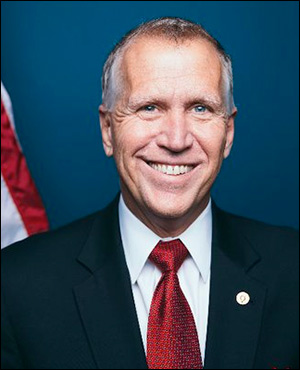By Jim Ellis

North Carolina Sen. Thom Tillis (R)
The article also points out that Sen. Tillis led the Republican efforts to protect Independent Counsel Robert Mueller’s role in investigating the president over possible Russian collusion and other tangential issues. This is yet another issue stance that pits Sen. Tillis against his Republican base.
The article suggests that three-term Rep. Mark Walker (R-Greensboro) could be testing the waters to make a senatorial run, reporting that the congressman has conducted a statewide poll. According to the Walker Camp only Rep. Mark Meadows (R-Skyland/ West Asheville) has higher name identification among the delegation members. At this point, Congressman Walker appears not to be eliminating any political option.
During the 2016 US Senate campaign, Sen. Richard Burr (R) indicated that he would not seek re-election after he completes his third term in 2022. Therefore, Walker may be looking not so much at a primary challenge to Sen. Tillis but could already be preparing for an open seat run three years from now.
Club for Growth president David McIntosh, himself a former congressman from Indiana, was quoted in The Hill story. According to him, not only could Walker upset Sen. Tillis in the next Republican senatorial primary, but Reps. Meadows and Ted Budd (R-Advance) could also deny Sen. Tillis re-nomination.
North Carolina’s competitive political nature means that the 2020 US Senate race will be among the country’s most hard-fought campaigns. Furthermore, the Tar Heel State electorate routinely defeats its incumbent senators. In fact, looking at the seat Sen. Burr holds, he became the first incumbent to win re-election since Sen. Sam Ervin (D) won a fourth term in 1968.
In the Tillis seat, since veteran Sen. Jesse Helms (R) retired in 2003 after a 30-year career, neither succeeding senators Elizabeth Dole (R) nor Kay Hagan (D) won a second term. Therefore, any challenge to an incumbent North Carolina senator must be taken seriously.
So far, the Democrats have not put forth a particularly strong field to challenge Sen. Tillis. Last week, the party leaders’ first recruitment choice, Attorney General Josh Stein, announced that he would seek re-election, thereby meaning he won’t be running for the Senate. Currently, only eastern North Carolina state Sen. Erica Smith (D-Gaston), and Mecklenburg County Commissioner Trevor Fuller are the two Democrats who have announced US Senate campaigns.
Aside from the border and Mueller issues, Sen. Tillis has been a strong Trump supporter. Therefore, it might be more difficult to engender long-lasting primary opposition to him within the GOP base. In any event, such a challenge would lead to a divisive Republican primary, and the Democrats could become big winners under such a scenario.
In order for the GOP to hold this seat in a swing state like North Carolina, avoiding a primary battle would be a key prerequisite toward winning the 2020 general election. Therefore, the impending moves surrounding Sen. Tillis’ re-nomination will prove critically important not only for the North Carolina race, but possibly in terms of which party will control the Senate majority post-2020.
